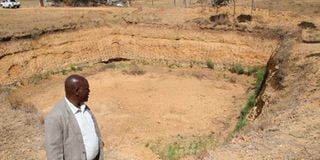Premium
Solio landowners forced to become casual labourers

Maina Mugo stands in front of a dry water pan at Solio Settlement Scheme in Laikipia County.
More than a decade after thousands of people were settled in the Solio Settlement Scheme, they have found no respite in their quest to use the land donated to them by the government.
Some of the more than 1,500 households settled there have resorted to leasing their plots to multinational companies that grow horticultural products while others have resigned themselves to fate.
Depending on their contracts, the farmers receive between Sh1,000 and Sh2,000 per acre per month. Despite leasing their land, the farmers live in poverty, sometimes relying on donations from well-wishers and the government.
The families were allocated about 4.5 acres each during the administration of former President Mwai Kibaki after being moved from the Mt Kenya forest. But they are unable to cultivate their lands due to erratic rainfall and lack of funds to invest in irrigation systems that would increase productivity.
They are now appealing to the government to help them build irrigation systems so that they can use their land and stop leasing it out.
The scheme is divided into seven villages and lies between Nyeri and Laikipia counties. It falls under the country’s arid and semi-arid zone category. With no other suitable economic activity, residents want the government to help them adopt climate-smart agriculture that can withstand the changing weather patterns.
Ms Rose Nyambura, 72, basks in the sun outside her homestead with her son and granddaughter. They are waiting for the Sh8,000 from their tenant at the end of the month.
“There is nothing we can do here... all we do is survive the month and wait for the end of the month and the cycle continues. I leased my farm about three years ago because I had no water or tools to pump water,” she said.
Ms Nyambura’s homestead has a dam that she uses for domestic purposes. She says it is not reliable in cultivating the half-acre she has set aside for subsistence. She says it dries up during the dry season, and when it is full, she cannot afford the pipes and generator to pump water into the farm.
Water pans
When Laikipia East MP Mwangi Kiunjuri was the Agriculture Cabinet secretary, the government sank small dams and water pans worth millions of shillings in the villages, but residents still struggle with water shortages. A spot check revealed a grim picture, with a number of the water sources having long dried up and turned into gaping holes that pose a risk for children and animals.
Most farmers use the water pans and dams for domestic purposes as they cannot afford to hire or buy the equipment necessary for irrigation.
Mr Michael Nyaga concurs with Ms Nyambura on leasing. “It would be a wasted resource not to cultivate the land and also not to earn from it when the opportunity arises. The amount we get is better than nothing.”
In a cruel twist of fate, most of the adult residents now work as casual labourers on their lands—the companies pay them Sh300 a day for tilling or harvesting.
Ms Nancy Watetu from Village 2 holds a bag of onions and potatoes she bought for Sh20 a kilo from her farm, which she leases to the Sinchi Group. Leasing the land, she said, has helped her cope with the high cost of living and enabled her to send her grandchildren to school.
It costs about Sh500 for a farmer to pump water from their water pan between morning and evening if they have their own hosepipe. They also have to buy three litres of fuel for each round of irrigation.
‘No source of income’
“This is expensive for us because we have no source of income. But if we had irrigation water, we would not have leased the farms,” says Ms Watetu.
Mr David Ndegwa, an agronomist, said with proper irrigation and good farming practices, one hectare of land can produce 30 bags of maize, one tonne of beans and eight tonnes of potatoes. This, he said, would be enough to feed the people in the seven villages and also supply neighbouring counties.





